“Unblocked Games WTF” usually refers to browser-based game hubs that still load on restricted networks. If you’ve seen classmates swapping links or found Google Sites mirrors that come and go, you’re not alone. This guide explains what the term means, how access controls work, safe ways to play, common fixes, better alternatives, and policy reminders.
What Is “Unblocked Games WTF”?
Before diving into access methods, it helps to understand what people mean by this phrase. In short, it’s a catch-all label for sites that host lightweight HTML5 titles—think Slope, Drift Hunters, Vex 4, or Run 3—and keep resurfacing under new subdomains or mirrors when the old ones get blocked.
These hubs persist because they’re simple and portable. Many run on platforms like Google Sites or Git services, making it easy to spin up new URLs. That’s also why you see variations such as “Unblocked Games 66/77/76” or “Classroom 6x”—different names, same promise: quick play with minimal installs.
Once you recognize the pattern, you’ll also understand the trade-offs. Fast access can mean an increase in ads, inconsistent quality, and a constantly shifting target of domains that change as web filters catch up.
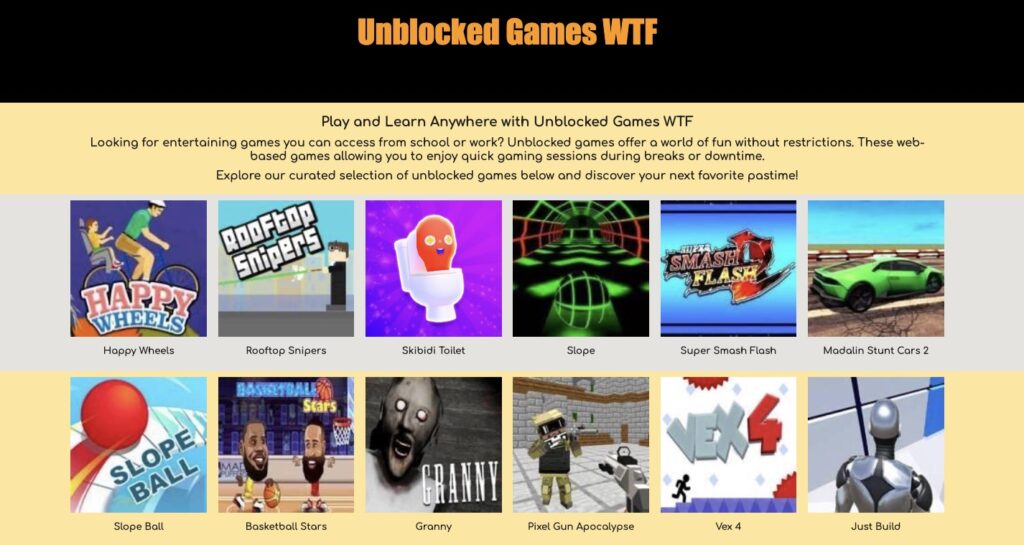
Is Unblocked Games WTF Safe or Legal?
Let’s separate the two issues that often get mixed up. First, legality: playing simple browser games isn’t usually illegal by itself. Second, policy: schools and workplaces set Acceptable Use Policies that limit non-academic or non-work activity, and network admins use filters to enforce those rules.
The safety question revolves around how these hubs monetize and how they’re managed. Some rely on aggressive pop-ups or trackers; others embed third-party code with limited oversight. That doesn’t automatically mean malware, but it raises risk. If you do play, use a modern browser with tracking protection, keep your device updated, and avoid downloading anything offered by a random overlay.
Privacy also matters. Many free portals fund themselves through ad tech and analytics. If you’re concerned about data collection, stick to reputable websites, disable suspicious notifications, and never enter personal details on a game page.
Why Schools and Workplaces Block These Sites
Understanding the “why” helps you decide “what next.” Network filters often categorize domains into groups—gaming, adult content, file sharing, and so on. When a site is labeled “games,” it’s added to a blocklist. Administrators also monitor bandwidth, productivity, and compliance; if a page spikes in traffic during class periods, it’s likely to get flagged.
Because mirrors pop up on shared hosting (for example, Google Sites), filtering may lag for a while, then suddenly catch up and block several URLs at once. SSL and DNS controls can also contribute: changes to DNS, certificate fingerprinting, or SNI filtering can make a previously reachable page stop loading without warning.
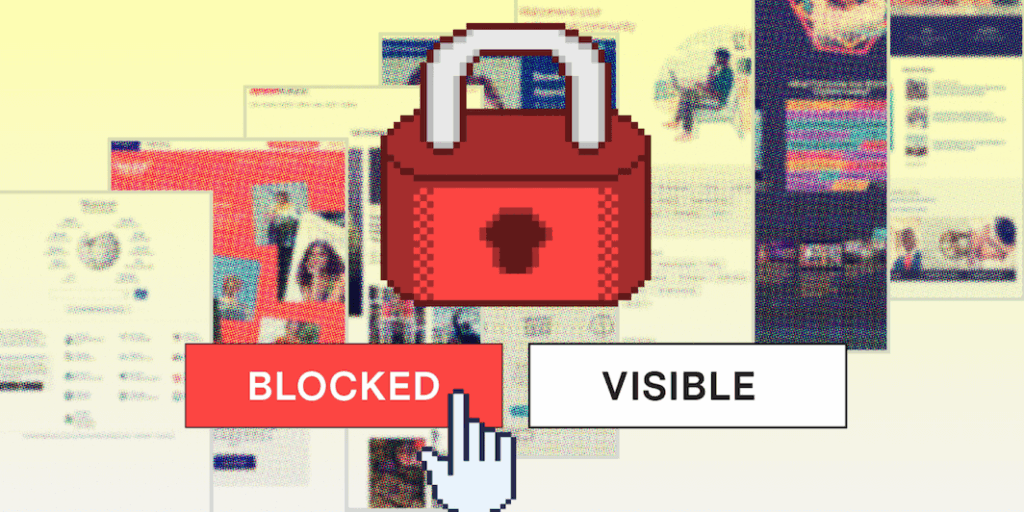
In practical terms, this is why access can feel inconsistent. One day, a link loads instantly; the next day, it times out, redirects, or shows a policy notice. That fluctuation is normal when you’re dealing with constantly shifting domains.
Responsible Ways to Access Unblocked Games WTF
If you’re determined to play, start by considering context and permission. On a school or work network, the safe and sensible approach is to follow the local rules. If the network prohibits games, the right answer is to wait until you’re on a home or personal connection where you’re allowed to browse freely.
When you are on a permitted network, you’ll see several common approaches discussed online. Each has trade-offs:
- Mirror or alternate domains. The simplest path is often trying a current mirror (e.g., a new Google Sites URL). It’s lightweight but fragile, and mirrors get blocked quickly.
- Web proxies or browser extensions. These can hide destination URLs but may inject ads, throttle speeds, or break game scripts. Carefully review permissions; avoid extensions with vague publishers.
- VPN on your own network. Encrypting traffic can make connections more consistent on public Wi-Fi and prevent snooping. Still, a VPN is not a free pass: it won’t override school or employer policies, and reputable providers don’t guarantee that any specific site will work all the time.
The key is to use any method only where it is allowed, and to prioritize your device safety and privacy while doing so.
How to Play “Unblocked Games WTF” on Your Phone (iPhone & Android)
Many readers actually search for “play Unblocked Games WTF on phone” or “Unblocked Games WTF iPhone/Android.” Mobile browsers run most HTML5 titles well, but there are a few setup steps that make a noticeable difference in stability and safety.
Before we dive into tactics, a quick reminder: always follow your school or workplace rules. If you’re on your own network and it’s permitted, the following suggestions help pages load faster, reduce pop-ups, and keep your data safer while playing.
Use a modern browser and tighten privacy defaults.
Turn on Enhanced Tracking Protection (or the equivalent), block intrusive pop-ups, and consider disabling third-party cookies. If a game requires cross-site resources, test in a secondary profile rather than relaxing global settings.
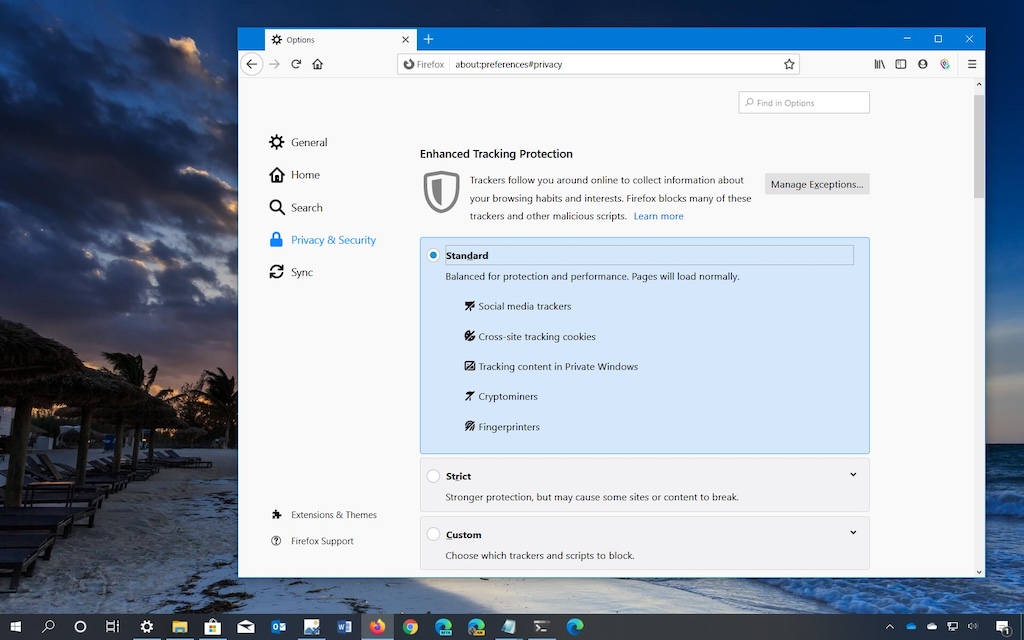
Mind your connection quality.
Game responsiveness depends on latency, not just raw speed. If video ads or heavy scripts cause stutters, try switching from congested public Wi-Fi to cellular data (or vice versa). Close background apps that sync aggressively while you play.
Consider a user-friendly VPN on permitted networks.
A lightweight VPN can help on public networks by encrypting traffic and smoothing unstable routes—use it only where your rules permit. On phones, prioritize fast connection and minimal friction. If you prefer that setup, BearVPN keeps it simple on iOS, Android, Windows, and macOS with a one-tap start, without guarantees about particular domains.
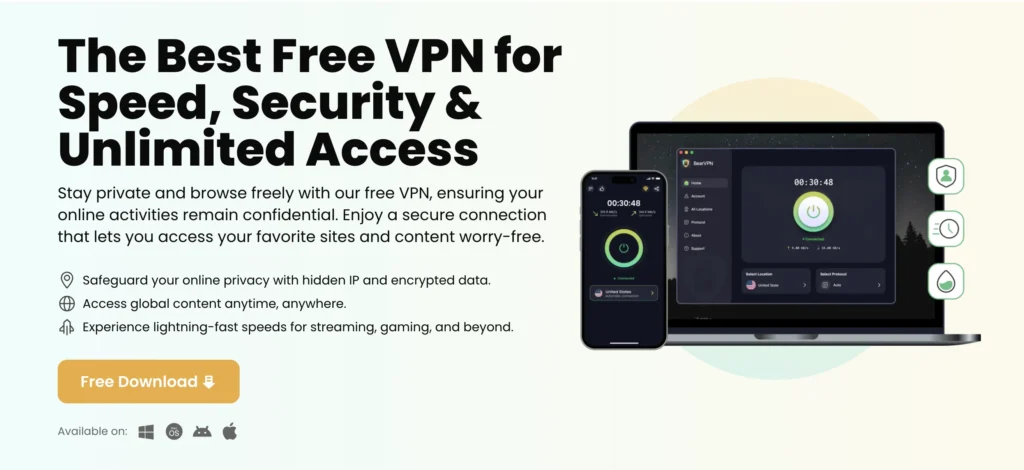
Keep expectations realistic.
Mirror sites change constantly. A VPN can improve privacy and sometimes routing, but it won’t force a down site to come back online and shouldn’t be used to bypass policies you’ve agreed to follow.
Common Problems and Quick Fixes
Before you assume a site is “gone forever,” run through a short checklist. Many “Unblocked Games WTF not working” issues trace back to cached scripts, a bad mirror, or an overzealous extension.
- “Site disabled” or endless redirects. Try a different known mirror, then search for the publisher’s current hub page. If the site lives on a shared platform, it may have been suspended temporarily.
- Game loads but won’t start. Clear cache/storage for the specific domain, reload in a new private tab, or switch to another browser. Some titles depend on features blocked by your privacy settings.
- Blocking toggles on and off. If you’re on a managed network, filters may update during the day. On a permitted personal network, briefly switching DNS resolvers (e.g., from ISP to a reputable public resolver) can fix stale records.
- Aggressive pop-ups or sketchy downloads. Close the tab immediately. Never install random “codecs,” “launchers,” or APKs suggested by a pop-up. If you mistakenly granted notification permissions, revoke them in your browser settings.
If none of the above helps and you’re on your own device/network, assume the mirror is retired. Reputable alternatives or a new hub are usually the fastest path forward.
Legit Alternatives to “Unblocked Games WTF” in 2025
When one portal fades, don’t chase every clone. Many players search “Unblocked Games WTF alternatives” for a reason: a small set of better-maintained hubs tends to stay usable longer and keep ads in check.
Similar Unblocked Game Sites:
Unblocked Games 66 is a browser-based hub that aggregates lightweight HTML5 titles—think quick picks like Slope, Run 3, Vex, and similar arcade or puzzle games. It’s best known for offering “unblocked” access on networks with stricter filters, often by rotating mirrors or subdomains. Because these portals are ad-supported and change addresses frequently, availability can be inconsistent. Use a modern browser, avoid downloads or pop-ups, and treat any mirror links with caution.
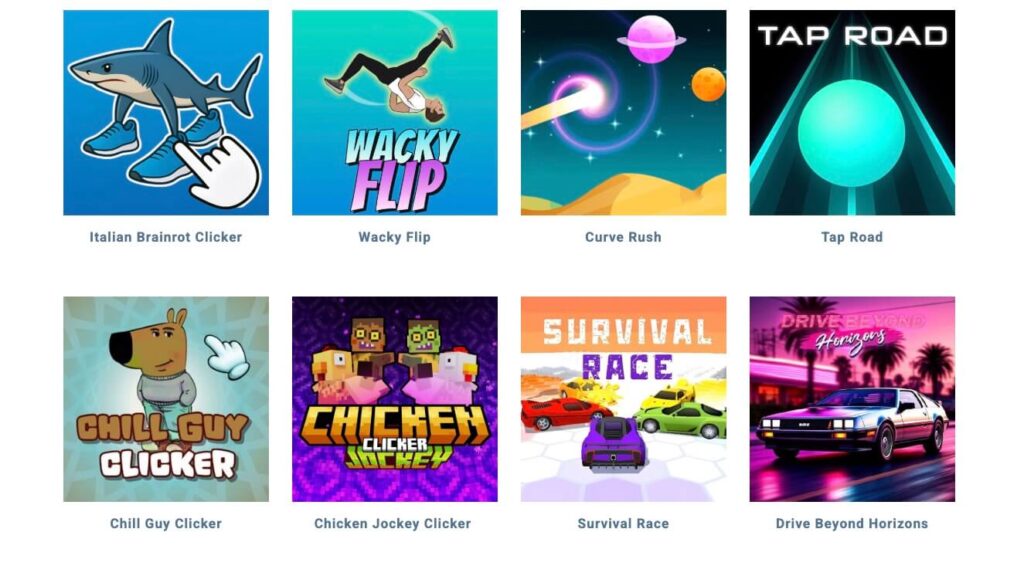
Classroom 6x Unblocked Games follows a similar idea but is framed as a school-friendly catalog of web games that load directly in the browser. The site (and its mirrors) typically emphasizes simple, no-install titles suited for short breaks, which is why it’s popular on managed devices. As with other unblocked hubs, domains may shift, and ad behavior can vary. If you try it, keep privacy settings strict, don’t enter personal info, and stick to well-known games that run without extra installers.
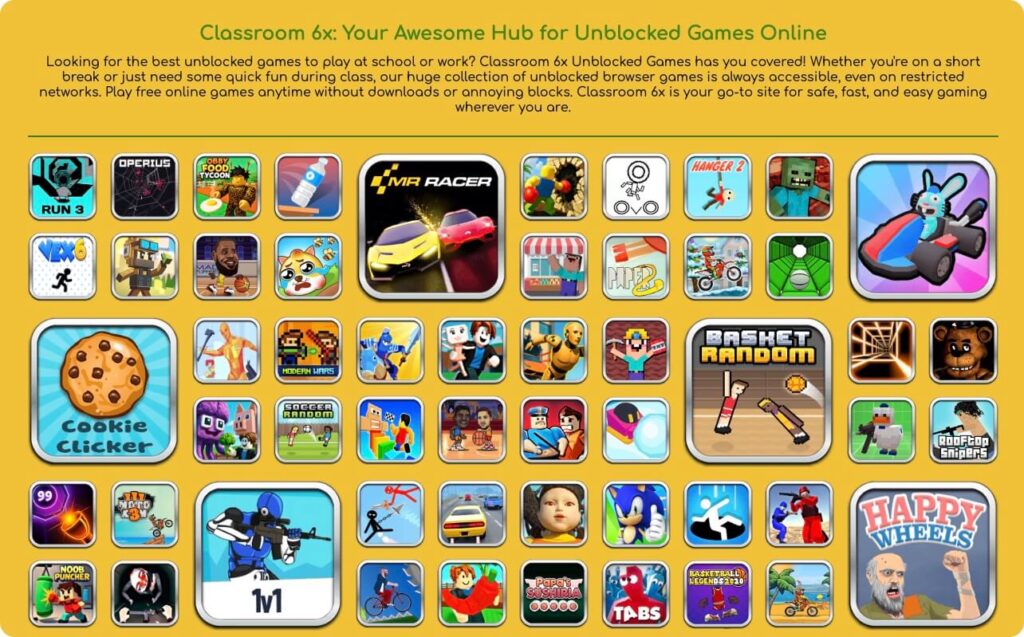
Instead of listing live links (which often churn), use this decision checklist to find safer options:
- Hosting reputation. Prefer portals hosted on well-known platforms with clear ownership, transparent contact info, and HTTPS by default.
- Ad behavior. A lightweight banner is normal; auto-install prompts, fake “system” scans, or full-screen hijacks are red flags.
- Game catalogue quality. Look for titles that load consistently—Slope, Vex, Run series, Drift Hunters—without extra launchers.
- Update cadence. Active curators remove broken games and update mirrors promptly; abandoned sites keep accumulating dead links.
- Device fit. If you mostly play on a phone, test a portal’s mobile layout first. Pinch-zoom contortions are a sign to move on.
This approach keeps you from getting trapped in a loop of low-quality clones while still satisfying the original, unblocked games intent.
Safety & Policy Reminder (Read This Before You Play)
This topic always comes back to context. If you’re browsing on a school Chromebook or a corporate laptop, your first responsibility is to the Acceptable Use Policy you agreed to. Even at home, consider time boundaries and content suitability if younger siblings use the same device.
For privacy, minimize personal data on game pages, close extra tabs, and don’t log into unrelated accounts while playing. On public Wi-Fi, avoid entering credentials on unknown domains, and keep your OS and browser patched. Good habits matter more than any single tool.
FAQs About Unblocked Games WTF
1. What does “Unblocked Games WTF” actually mean?
It’s shorthand for web portals that host simple, browser-based games and try to avoid filters by rotating domains. The content is typically HTML5 and needs no installation.
2. Is it legal?
Playing browser games isn’t usually illegal per se, but you must follow your school or workplace policies. Those rules can explicitly forbid gaming traffic on managed networks.
3. Why do links work one day and fail the next?
Filters update, mirrors get taken down, and shared-hosting platforms suspend sites that violate terms. DNS caching can also make an old URL look “alive” when it isn’t.
4. Can I play on my phone?
Yes—modern mobile browsers handle most HTML5 titles. For smoother play, tighten privacy settings, switch networks if latency spikes, and, where allowed, consider a mobile VPN to encrypt traffic on public Wi-Fi.
5. Which is better: Unblocked Games 66/77/WTF or Classroom 6x?
They’re variations on the same idea. Evaluate each site by ad behavior, update cadence, and how reliably core titles load on your device.
Conclusion
“Unblocked Games WTF” isn’t a single website; it’s a moving target of mirrors offering fast, no-install games. If you decide to play, prioritize safety, privacy, and policy compliance. Stick with reputable hubs, use modern browser protections, and, on allowed networks, consider a VPN like BearVPN to keep public Wi-Fi sessions private. Good judgment will spare you broken links—and bigger headaches.



